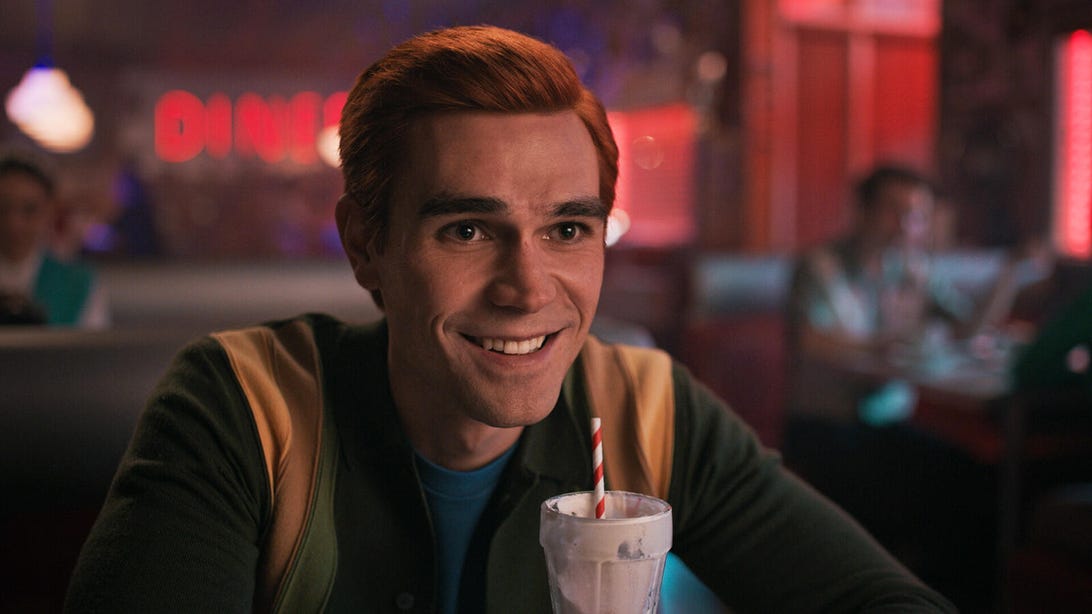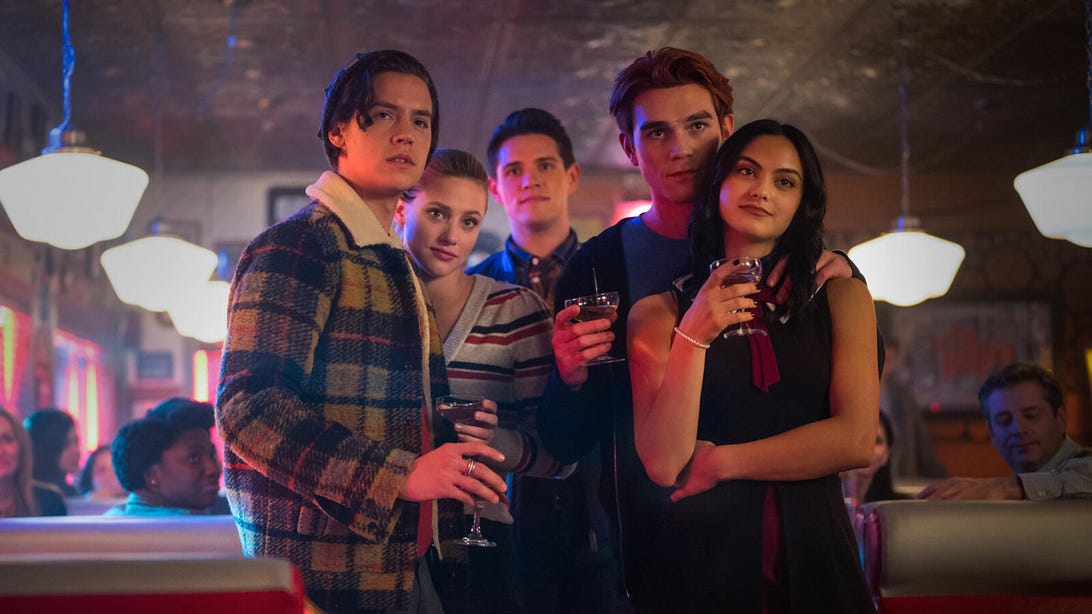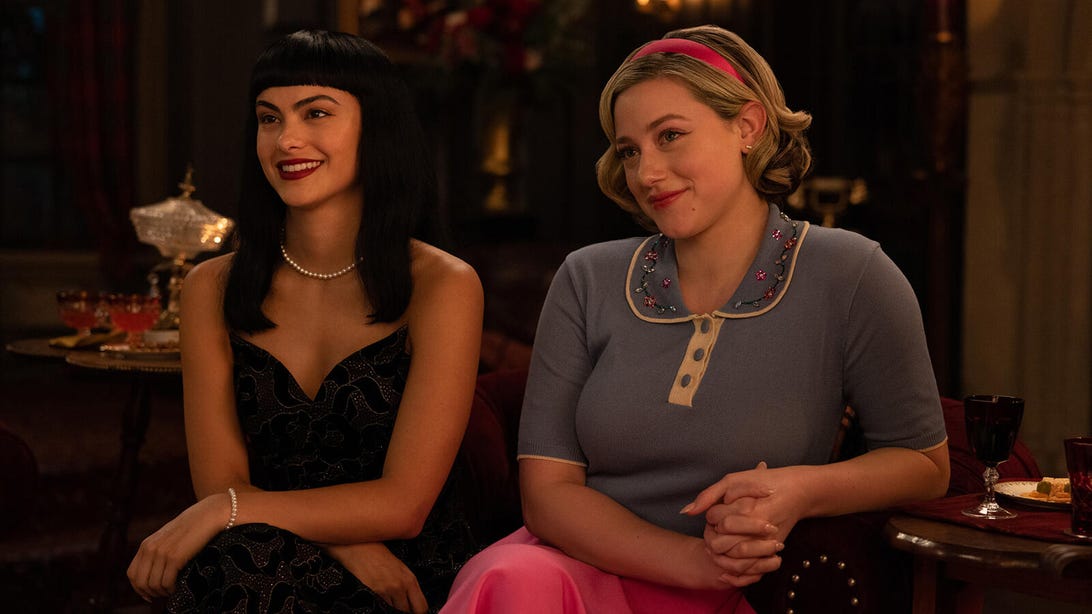Join or Sign In
Sign in to customize your TV listings
By joining TV Guide, you agree to our Terms of Use and acknowledge the data practices in our Privacy Policy.
Riverdale Was Too Ambitiously Bizarre to Ever Be Bad
The CW's teen soap got weirder, but it never got less fun

KJ Apa, Riverdale
The CW"Archie got hot!" Kevin Keller (Casey Cott) exclaimed four minutes into the first episode of Riverdale. That was how the show announced itself: not so much as a direct adaptation of the early Archie Comics, but as a contemporary teen soap with sex, violence, and modern-day pop-culture references.
It was easy to view this reimagining cynically, especially if you were a comics purist. Betty Cooper (Lili Reinhart), the academic-minded girl next door, now had a dark alter-ego (later explained by the "serial killer gene" she inherited) and a passion for exposing the criminal underbelly of her hometown. Her love interest was Jughead Jones (Cole Sprouse), the comics' crown-wearing slacker known for his big appetite and disinterest in girls. (He didn't even eat a burger on screen until the first season finale — an episode that also featured a steamy make-out dashing fans' hopes for an explicitly asexual take on the character.) The shift in tone was perhaps most apparent with Miss Grundy (Sarah Habel), the white-haired schoolteacher, who had been reconfigured as an attractive young music teacher grooming the sophomore protagonist.
It becomes clear after watching a few episodes of Riverdale, though, that it's altogether weirder and more idiosyncratic than its "hot Archie who f---s" starting point might suggest. Especially if you were a teen or twentysomething in 2017, Riverdale helped fill the void left by other amusingly deranged soaps like Gossip Girl, Glee, and Pretty Little Liars. It often functioned as both a straightforward, sincere character-driven teen show and an almost parody-level subversion of the same. The show was funny and emotional and surreal and earnest and ironic, all at once.
It began with a Twin Peaks-esque small-town murder mystery, which provided the show a sturdy structure to explore familiar high school hierarchies and love triangles that gradually bloomed into hexagons. Many would still argue that that first season was the peak; a large part of the audience (including, anecdotally, most of my friends) fell off the show sometime in Season 2 or 3, after the move to 22-episode seasons resulted in some clunky storytelling and character inconsistencies that became harder to ignore. It's true that Season 1's 13 episodes work as a perfect little self-contained story, both better paced and more emotionally fulfilling than most of the later arcs.
But even in the weaker seasons, I think people underrate Riverdale's ability to morph and change. This is a show that has reinvented itself every year, following strange narrative pathways and experimenting with genre in a way that feels wholly its own. When it transformed into full-on camp sometime around Season 3, it may have lost some of its capacity to move its audience. But it remained deeply entertaining, far too consistently batsh-- crazy to lapse into dullness the way so many long-running, 20-episodes-per-season series do. Season 3 alone features an organ-harvesting cult, a juvie prison break, a deadly D&D-esque role-playing game, and a serial killer called the Gargoyle King. It also featured this iconic quote, which went viral with the help of fan accounts like no context riverdale: "That means you haven't known the triumphs and defeats, the epic highs and lows of high school football."
That line, spoken by Archie (KJ Apa) in response to a cellmate who just mentioned dropping out in the fourth grade to run drugs, has become a go-to laugh line for non-viewers and drive-by scoffers looking for an easy target. But the exquisite ridiculousness of the line is the point, especially paired with the sheer earnestness of KJ Apa's delivery. Even today, many viewers refuse to accept the idea that Riverdale is intentionally funny, that guffawing at the dialogue is a good sign, not a bad one.

Cole Sprouse, Lili Reinhart, Casey Cott, KJ Apa, and Camila Mendes, Riverdale
Kailey Schwerman/The CWRiverdale never became a bad show; it became a different one, with different priorities, choosing fun and experimentation over the initial "Greek suburban tragedy" vibe that Betty identified at the end of Season 1. And even when certain character dynamics went in circles — especially in the push-pull relationship between Veronica Lodge (Camila Mendes) and her antagonist "Daddykins," Hiram (Mark Consuelos) — the writers kept the episode-by-episode experience fresh.
There have been rough patches, sure, especially for stretches of Seasons 4 and 5. Those were two very transitional seasons, affected by both COVID and the death of Luke Perry, who played Archie's father. At times, showrunner/executive producer Roberto Aguirre-Sacasa and his writers' room struggled to balance serious character development with fun; certain ongoing stories felt boring when they didn't prioritize the latter. (Archie's volunteer fire department comes to mind.) Occasionally, characters stuck around far longer than they really needed to, whether villains (Hiram) or bland good-guy additions (Archie's war buddy Eric [Sommer Carbuccia], not to mention his Uncle Frank [Ryan Robbins]).
But there were still moments of real feeling in those middle chapters. The Season 4 opener, which completely dropped the show's usual hallucinogenic weirdness to explore Archie's grief over the loss of his father, was an instantly heartbreaking classic, arguably rivaling Glee's"The Quarterback" in its balance of character tribute and actor tribute. Similarly, Season 4's intended graduation-episode finale was refreshingly human, even if the conclusion of its silly snuff-tape story may have fallen flat. And a Hiram origin story in Season 5 added some surprising emotional depth to a character who had long since overstayed his welcome.
By and large, though, depth and emotional investment and even basic coherence were no longer the primary aims of the show, if they ever were to begin with. And that's not necessarily a bad thing! Some would even argue that the intense focus on Big Bads and serialized mystery arcs was holding Riverdale back from becoming its best and craziest self.
Maybe those fans would consider Season 6 a late-series high point — and I'm inclined to agree, even if I have a soft spot for the first. Coming out the gate with a five-episode "Rivervale" arc that finally introduced the supernatural to the world of the show, Season 6 represents Riverdale at its most self-actualized: gloriously bizarre and deliriously fun. It's fully formed madness, and it doesn't let up once the alternate-dimension story ends. The craziness is only just getting started: When we return to the "normal" dimension, the teens all have superpowers, forced to fight back against an immortal racist British warlock named Percival Pickens (Chris O'Shea) who's set on gentrifying Riverdale and enslaving its townspeople with mind control.
It all feels a bit reminiscent of Ryan Murphy's "throw things at the wall and see what sticks" writing strategy. But unlike the worst seasons of American Horror Story, where the mess of dropped plotlines and convoluted layers of story become tedious to watch, Riverdale rarely loses its capacity to entertain.
Again, leaning fully into campiness can put emotional verisimilitude at risk. Compared to those occasional moments of real emotion scattered throughout previous seasons, Season 6 has no interest in jerking tears. There's nothing in that season as tender as Jughead's interactions with his dad (Skeet Ulrich) from Season 1 — or as singularly disturbing as that original clip of Clifford Blossom (Barclay Hope) shooting his own son in the head. But it's no small feat for a show to keep its audience guessing this deep into its run. I watched most of that season in a stupor, texting my sister about every ridiculous or mind-melting event that I couldn't believe I was watching.
If you're a longtime fan of this show, there's a good chance that you experienced a moment when you made peace with its inherent messiness. For me, it happened sometime in Season 5: I stopped caring whether Betty's post-time jump career as an FBI agent was a worthy follow-up to her time as an idealistic student journalist, and I stopped thinking about whether Veronica's newest business venture (a shady jewelry shop) too closely resembled her last one (a speakeasy). It's not that Riverdale is above criticism; I've heard plenty of valid critiques recently, including that Season 7 underuses and disrespects late-series addition Tabitha Tate (Erinn Westbrook). And yet I find it difficult, this far along, to really care about the ways that the show does or doesn't fail its characters. It almost seems beside the point; everything is in service to one grand absurdist vision.
You'd think the final season of Riverdale would have continued in the same vein as its predecessor: one final war between good and evil, full of gasp-worthy moments. But it's almost impossible to truly predict where a new season of Riverdale will go, isn't it? Perhaps what we got instead is even more fitting: a swan song that pivots away from plot and forgoes narrative urgency in favor of a soft reboot set at Riverdale High in the '50s. With the resurrection of the Archie-Betty-Veronica love triangle, the return of Ethel Muggs (Shannon Purser), and the decrease in (but not complete absence of) murder, these final outings more closely resemble the original comics than any season before.

Camila Mendes and Lili Reinhart, Riverdale
Justine Yeung/The CWWhen the show comes to an end next week, six and a half years and seven seasons after its premiere, it will have the responsibility to reconcile these many different versions of itself. That means resolving the journeys of not just the characters we followed for the first six seasons, but their parallel versions in the '50s.
In a way, though, that's a task that the show has already spent its final season completing. With everyone's memories wiped, we've seen them reduced to their basic archetypes, remixed versions of the characters we know. (Apa's much more upbeat, dopey version of Archie is the unlikely standout.) It's a bit like if Lost spent the entirety of its final season in the flash-sideways timeline — Riverdale's penultimate episode even features several tearful "I remember everything" sequences reminiscent of that show's finale afterlife reunion.
I've rolled my eyes at Riverdale plenty of times over the years, especially when it pads out runtimes with interminable musical sequences and half-baked social justice commentary. (One new Black character in the final season, Clay [Karl Walcott], seems to exist solely to explain race, queerness, and poetry to the white characters.) Watching this show in its final years does feel fundamentally different than it did at the beginning, and there's nothing wrong with acknowledging what was lost in that transition.
But what grew in its place was something else — something weird, ambitious, and truly memorable. If we're lucky, history will be kind to Riverdale. And when future generations of viewers stumble across it, they'll feel free to laugh — not at the show, but with it.
Riverdale's series finale airs Wednesday, Aug. 23 at 9/8c on The CW.